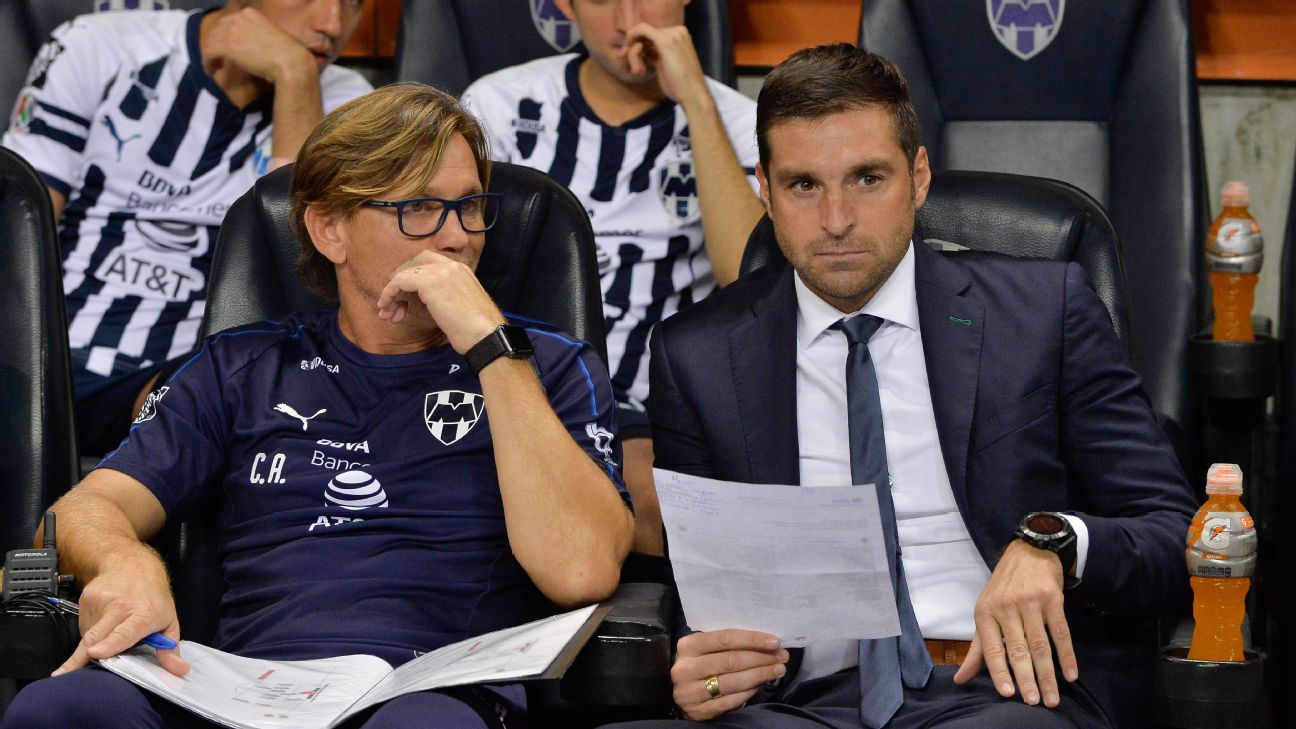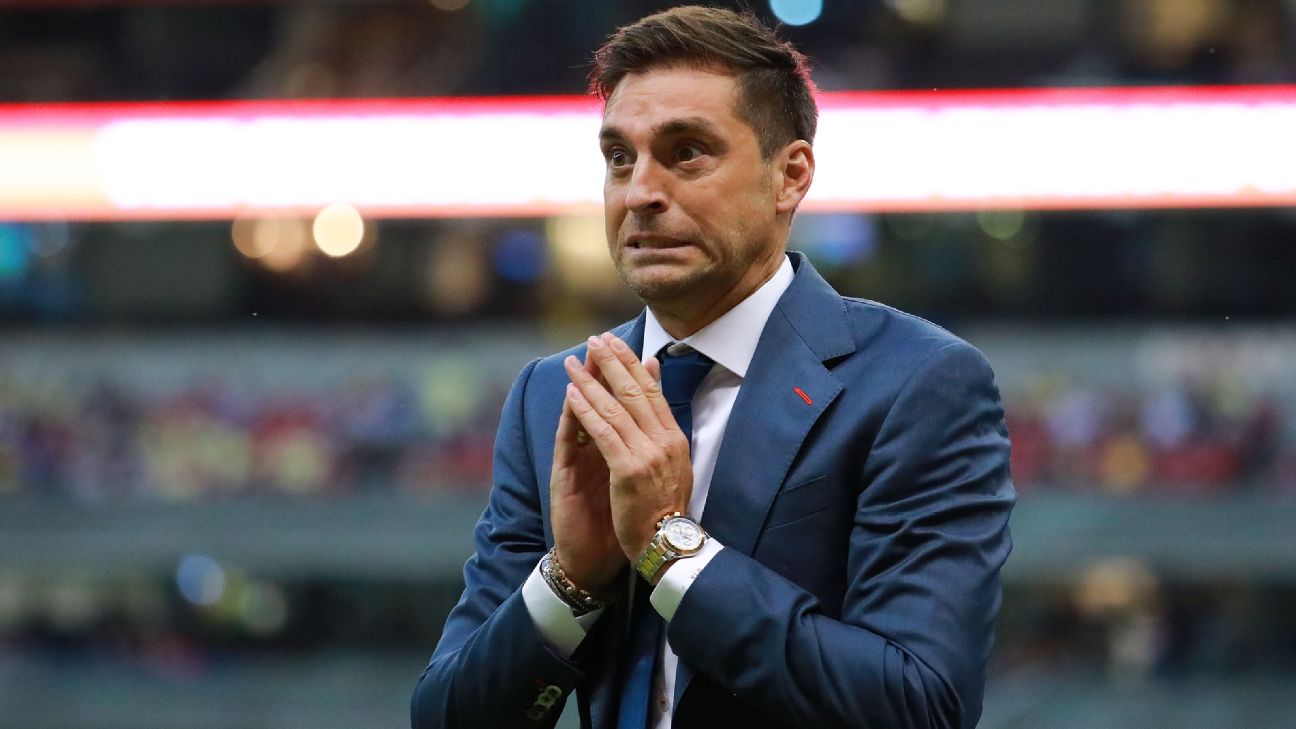Products You May Like
When all the murmurs out of David Beckham’s Inter Miami CF hinted at the club naming a head coach with substantial Champions League credentials, the assumption was that it would be someone with recent experience in the European edition. The newest Major League Soccer franchise, set to debut in 2020, was linked with several high-profile managers but instead of a name like Carlo Ancelotti, Santiago Solari, Marcelo Gallardo or Patrick Vieira, two-time CONCACAF Champions League winning manager Diego Alonso — who did play in the UEFA version with Valencia — is now charged with taking the reigns of one of MLS’ most ambitious newcomers.
— MLS 2020 season: All you need to know
— Stream on ESPN+ the best moments of MLS 2019 season!
Inter Miami wouldn’t have been short of options even though securing a big name is often a complicated task. So what it is about former striker Alonso that turned Beckham’s and sporting director Paul McDonough’s heads, and what will the former Uruguayan striker bring to MLS?
Playing philosophy: Positive but practical
“We want to be an aggressive, offensive team,” said Inter Miami managing owner Jorge Mas in an October interview with Sports Illustrated. “One that our community can be proud of. One that’s going to make a mark all over the world.”
Alonso’s track record based on his spell in Liga MX with Pachuca and then Monterrey is more one of pragmatism and finding balance, rather than all-out attack. His coaching DNA leans more toward possession-based football, though that depends on the squad he has at his disposal.
Influenced by his former coaches Julio Ribas — known for his work ethic and mental coaching — Argentine Hector Cuper and Spaniard Juande Ramos, Alonso believes in Pep Guardiola’s idea that the best coaches are “idea thieves” and should seek to be open-minded when looking for new concepts. Alonso knew even as a highly-touted 21-year-old striker that his true calling would be on the bench. He began taking notes of each training session while still a player and accumulated experience through a career that took him from his native Uruguay to Argentina, Spain, Mexico and China.
There’s commitment to rapid attacking transitions and the implementation of a 4-2-3-1 or 4-3-3 formation the vast majority of the time, but it’s a more reactive philosophy than South American MLS successes Matias Almeyda or Gerardo “Tata” Martino.
“In varying situations, you can have different characteristics that can help you against different opposition,” Alonso told Fox Sports on being appointed at Monterrey in May 2018. Or, as Alonso told The Coaches Voice, “There’s something that for me is fundamental: the playing philosophy isn’t mine, but the whole team’s. The art of coaching should be that the playing philosophy is everyone’s not by imposition, but by conviction.”
During his time at Pachuca (Dec. ’14 to May ’18), Alonso’s team had the sixth-highest average possession of any Liga MX club in that period, was fourth in shots on goal and earned 1.5 points per game; even though Los Tuzos failed to reach the playoffs in his final three seasons, Alonso’s work was positive with a young team. That Pachuca side was considered relatively aggressive but when his defining game against Tigres in the CONCACAF Champions League final came along, he unveiled a well-rehearsed plan to stop the Liga MX powerhouse. Los Tuzos ended up lifting the trophy with 35 percent average possession over the two legs of the final.
At Monterrey, Alonso inherited a side that had been ingrained in more direct, counter-attacking football after almost three years under “El Turco.” Alonso preferred not to upset the balance immediately but after the CONCACAF Champions League victory in May 2019, he appears to have attempted to shift things up — possession jumped from 46.4 percent in his first year to 54.6 percent over the 12 games of the 2019 Apertura, fourth-highest in the league. Alonso also showed his mettle as a leader, juggling a large and deep squad full of internationals that meant some, like Dutch striker Vincent Janssen, had to get used to spells on the bench.
In the end, a combination of factors cost him his job. Results early in the 2019 Apertura (16 points from 12 games) led to criticism from fans and eventually his exit at the end of September at a club that built a squad to challenge for trophies.
An obsessive management style focused on hard work
A return to a more direct and counter-attacking style via returning coach Mohamed saw Rayados players celebrating the 2019 Apertura title last Sunday at the Estadio Azteca. Alonso hasn’t spoken about his time at the club since leaving but scoring hero Rogelio Funes Mori, Carlos Rodriguez and even Janssen all made a point of bringing up his role in their championship win after the game.
“Diego gave me complete confidence, I’ll always be grateful to Diego for the opportunity,” Rodriguez said Sunday and there’s a respect for his work at Monterrey despite the early ending.
“He gave everything; he’s a guy that without doubt will do really well wherever he ends up,” said Monterrey sporting director Duilio Davino, who himself was under pressure earlier in the season and, just perhaps, needed a scapegoat of sorts when he changed coaches.
As a coach, Alonso is intense, dedicated, articulate in Spanish and is a forward-thinker in terms of modern methodology. The father of two is animated on the touchline and maintains good relationships with his players — although he has stated he couldn’t actually be friends with them — and isn’t going to be throwing out Zlatan Ibrahimovic-esque quotes.

“I believe that there are different type of coaches and I think that I am the type that doesn’t defend himself in front of the microphones, but instead on the pitch when it’s time to work,” Alonso told ESPN in 2016. In short, he’ll be putting the glitz and glamor of South Florida to one side.
The tall, imposing Alonso also boasts a reputation of being borderline obsessive about the game. Asked in one interview at Pachuca what he does away from the game, Alonso struggled to answer, indicating “I don’t do anything else” before saying he liked visiting different parts of Mexico, away from the touristy areas of Cancun and Acapulco.
He isn’t the type to hype up the possibility of titles, either. “There is no one who can promise a title, there is nobody who can promise a triumph; it’d be a lie,” he told Fox Sports in 2018.
Any player coming to Miami because of the lifestyle, weather and beaches will have a shock when they meet the hard-working, detailed-obsessed Alonso for preseason.
A commitment to youth talent
“We want a coach who can lead not only the first team but can set the tone in the academy system,” Mas said in that same Sports Illustrated interview. “[A coach] who can put his fingertips on developing young players for the future and really the whole organization.”
Of all the criteria Mas and McDonough would’ve been looking for in a head coach, youth development is the area where Alonso would’ve scored highest. The Uruguayan has a firm belief in young players and has demonstrated he can both develop them and win trophies in the process. Those inside Pachuca noted Alonso’s ability to remember the names and even personal backgrounds of players at the younger end of the academy, taking a personal interest in their progress.
At Pachuca, Alonso handed 23 players first-team debuts and oversaw the development into the senior squad of Hirving Lozano, Erick Gutierrez, Rodolfo Pizarro and Victor Guzman — all rising Mexico stars who played a part in the 2016 Clausura title for Los Tuzos.
Even at Monterrey, a club with a huge budget to go out and sign players, current Mexico international Rodriguez was a breakout star under Alonso, who gave “Charly” his opportunity and watched him blossom into one of the outstanding Mexican players of his age group. Alonso won’t be afraid of dropping an experienced name to pave the way for a youngster coming through.
Winning mentality
Alonso might not guarantee titles and success but he’s shown he’s capable of guiding teams to trophies. The Liga MX title and CONCACAF Champions League with Pachuca both came with a young team that was considered underdogs in each final, while the CCL win with Monterrey came against Tigres at home and under a lot of pressure, following brutal losses for the club in the 2016 Clausura final (against Alonso’s Pachuca) and the 2017 Apertura against local rival Tigres.
Alonso might not be the big name that many expected but there are few coaches in North America who have a record as strong as his. Signing him is a coup of sorts for the fledgling franchise, too: he was linked with Liga MX giant Chivas, whom he met with after leaving Monterrey, though in the end the two sides couldn’t come to an agreement.
In official games for Pachuca (excluding Copa MX) Alonso’s record was 59 victories, 39 ties and 44 losses in 142 matches. For Monterrey, it was 32 wins, 18 losses and 12 ties. Neither are bad given Liga MX is known for its relative parity.
